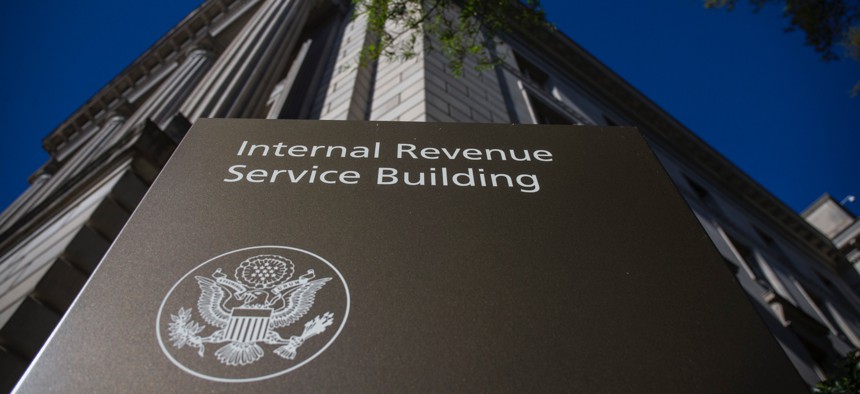
IRS officials had planned to bring on 3,833 revenue agents in fiscal 2023, but in the first six months officials had recruited just 34. Zach Gibson / Getty Images
Applications for revenue-generating IRS jobs are ‘far below’ agency goals
The tax agency is facing major hurdles with its big ambitions for hiring to slash uncollected taxes.
The Internal Revenue Service has a lot riding on getting the people it needs into the agency.
The agency is using the unprecedented funding it received from the tax, climate and health care bill known as the Inflation Reduction Act for a hiring surge it has said could generate as much as $851 billion in new revenue as additional, and more seasoned, auditors force more high-income individuals and corporations to pay the taxes they owe.
IRS has already begun targeting such taxpayers, and is beginning to scratch the surface of its grand ambitions: an early campaign to target 1,600 seriously delinquent millionaires has so far resulted in more than $500 million recovered tax payments. Its larger efforts, however, are running into a wall—or perhaps more of a vacuum.
A new report from the Treasury Inspector General for Tax Administration on the initial implementation of the IRA found IRS is failing to bring on its first wave of specialists to focus on increasing compliance for large corporations, large partnerships and high-income/high-wealth individuals. The agency has made some progress—it has eliminated barriers to posting job openings—but is still facing headwinds that are largely outside of its control. Revenue agents for those roles have “yet to be hired and onboarded,” the IG said.
“External applications that have been received are far below the IRS targeted goal and there is an overall shortage of individuals with the desired background and experience,” TIGTA found.
A previous IG report found that despite its new funding, revenue agent staffing had actually decreased by 8%, or more than 650 employees, between the end of fiscal 2019 and March 2023. IRS had planned to bring on 3,833 revenue agents in fiscal 2023, but in the first six months officials had recruited just 34.
IRS officials are aware of the problem and are attempting to develop solutions. The agency has completed an enterprise-wide recruiting strategy for revenue agents and is “exploring options” to better promote related job announcements.
“We are making remarkable progress in our efforts to transform the IRS and the pace of change is accelerating as we use the historic funding from the IRA,” said David Padrino, IRS’ chief transformation and strategy officer. He noted that overall, the agency has completed 45% of its fiscal 2023 milestones, while 55% were underway and just 2% had not yet been addressed.
Still, some of IRS’ shortfalls may be systemic. Erin Collins, the National Taxpayer Advocate, warned in a recent report the IRS Human Capital Office “lacks the necessary resource investments,” including IT and staffing, to keep up with the agency’s new hiring demands. Citing the pay gap between federal and private sector employees, the taxpayer advocate said it would be “unreasonable to expect the IRS to consistently out-recruit the competition.” The agency has maintained expedited hiring authority, but even when using it in fiscal 2023 the average time between a job announcement and a start date was 110 days.
Additionally, the Government Accountability Office found last month IRS is failing to detail its current and future needs, where skill gaps exist and its strategy for filling them. It has broad hiring plans and types of roles for which it will hire, but has not specified which workers would go toward high-income/high-wealth audits.
IRS is also facing political headwinds. Congressional Republicans have decried the hiring as a “power grab,” and the agency itself has warned its workforce could be facing a “cliff” in several years when IRA funds are set to expire. Sen. Rick Scott, R-Fla., even wrote a letter to Americans imploring them not to apply for the forthcoming jobs.
Collins suggested IRS invest more in using the Pathways and Presidential Management Fellows programs to recruit employees. She also said the agency should consider contracting with recruiting firms to help it bring in candidates for higher-grade positions. Collins noted IRS has made significant gains in hiring for customer service positions—the agency completed a total of 34% more hiring actions in fiscal 2023 than the previous year—but said the outstanding problems threaten what it is trying to accomplish.
“If the IRS does not make significant changes, these staffing shortages will compound and pose significant threats to federal tax administration and taxpayer rights,” the taxpayer advocate said.
The challenges do not come as a surprise: Collins and former officials—including Danny Werfel, who has since once again become IRS commissioner—warned when the IRA was passed that fulfilling the agency's staffing goals would present significant difficulties.
IRS is also looking to develop flexible work options, but TIGTA found in its new report that progress in that area has been delayed. The agency is still looking to onboard a project lead in that area and is determining what is feasible based on other agency practices. The Treasury Department last month mandated that employees work from their offices at least 50% of the time.
The agency is also creating a pulse survey to establish a baseline on employee morale, while officials have presented to the Transformation and Strategy Office three options for improving employee recognition and educating managers about rewards for staff.
NEXT STORY: State selects 4 new Science Envoys







